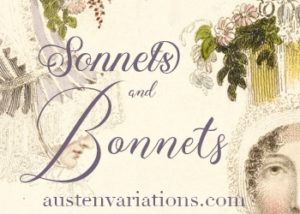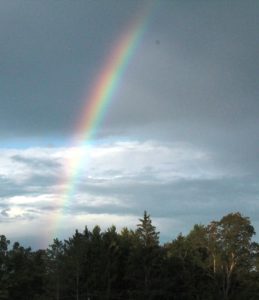 I have to admit that I have never been much of a poetry reader, and asking me to write a poem is liable to send me into a panic. But I decided to jump right into the Sonnets and Bonnets theme and see what I could come up with. One type of poetry I enjoyed when I was younger was that related to nature. My mother had a volume of Robert Frost’s works that I really liked. So, I decided to start my exploration of poetry in Jane Austen’s time by looking at the Lake Poets. After all, this was the Romantic Period (which reached its peak in the first half of the 1800s), and attitudes towards nature were changing. We know that Elizabeth Bennet enjoyed long walks, and I have always chosen to believe that she appreciated the beauty and wonder of the natural world. Marianne Dashwood strikes me as another Austen heroine who would feel the same, and perhaps Fanny Price.
I have to admit that I have never been much of a poetry reader, and asking me to write a poem is liable to send me into a panic. But I decided to jump right into the Sonnets and Bonnets theme and see what I could come up with. One type of poetry I enjoyed when I was younger was that related to nature. My mother had a volume of Robert Frost’s works that I really liked. So, I decided to start my exploration of poetry in Jane Austen’s time by looking at the Lake Poets. After all, this was the Romantic Period (which reached its peak in the first half of the 1800s), and attitudes towards nature were changing. We know that Elizabeth Bennet enjoyed long walks, and I have always chosen to believe that she appreciated the beauty and wonder of the natural world. Marianne Dashwood strikes me as another Austen heroine who would feel the same, and perhaps Fanny Price.
In reading about the Lake Poets, I came across Charles Lamb (1775-1834). Lamb was a minor poet. He never made a living from his writing (poetry or otherwise), although I gather he found some success with them. Instead, he spent his entire career working for the East India Company. He was a contemporary of and long-time friends with Samuel Taylor Coleridge and William Wordsworth. It is perfectly reasonable, to me at least, to assume that Austen and her characters were aware of Charles Lamb and were familiar with his poetry. I found one in particular that I really liked. I am sharing it with you below in a very short vignette. The vignette takes place in that between time towards the end of Pride & Prejudice. Lydia and Wickham have married and been to visit Longbourn, but Bingley and Darcy have not returned to the neighbourhood. Elizabeth has no expectation of ever seeing Darcy again, which, of course, is very sad since she now recognises that she cares for him.
Elizabeth was standing just outside Longbourn on the stone-covered drive. The ground was too wet to take a walk, but the rain had ended the stifling late-summer heat, and the world smelt fresh and clean. A sense of peace filled her. She was glad Lydia and Wickham were gone, and although it pained her to think such things about one of her sisters, she hoped they would not meet again soon. It was difficult to think about what might have happened with Mr Darcy had not Lydia eloped with Wickham. But, she had resigned herself to a life without him. What choice did she have?
“Everything will be better again,” she said softly, though there was no one to hear her, except for a few birds and the trees.
She took a deep breath, and her eyes swept the landscape. The colours of the trees and grasses and flowers, even that of the stones upon which she stood, seemed sharper after the rain. When she caught sight of a rainbow, a delighted smile overtook her face, and she whispered the words of a poem she recalled.
After the tempest in the sky
How sweet yon rainbow to the eye!
Come, my Matilda, now while some
Few drops of rain are yet to come,
In this honeysuckle bower
Safely sheltered from the shower,
We may count the colours o’er.—
Seven there are, there are no more;
Each in each so finely blended,
Where they begin, or where are ended,
The finest eye can scarcely see.
A fixed thing it seems to be;
But, while we speak, see how it glides
Away, and now observe it hides
Half of its perfect arch—now we
Scarce any part of it can see.

What is colour? If I were
A natural philosopher,
I would tell you what does make
This meteor every colour take:
But an unlearned eye may view
Nature’s rare sights, and love them too.
Whenever I a rainbow see,
Each precious tint is dear to me;
For every colour find I there,
Which flowers, which fields, which ladies wear:
My favourite green, the grass’s hue,
And the fine deep violet-blue,
And the pretty pale blue-bell,
And the rose I love so well,
All the wonderful variations
Of the tulips, pinks, carnations,
This woodbine here both flower and leaf.
‘Tis a truth that’s past belief,
That every flower and every tree,
And every living thing we see,
Every face which we espy,
Every cheek and every eye,
In all their tints, in every shade,
Are from the rainbow’s colours made.
She offered her quiet thanks for the beauty and wonder of nature. Somehow, the sight of the rainbow brought hope to her heart. Everything will be well, she thought. Whatever happens, wherever I end up, I will be well, as long as there are rainbows to see now and again. With a smile on her lips, Elizabeth returned indoors.
Two days later, Mr Darcy and Mr Bingley returned to Netherfield.
I hope you enjoyed the poem and the vignette!
Lucy

20 comments
Skip to comment form
Lovely. Thank you, Lucy!
Author
Thank you for commenting! 🙂
I’m also not a big poetry fan! I do remember concentrating on a couple that I quite liked for my GCE in English Literature while at school (luckily enough to pass!)
I do like this one though so thank you for sharing it.
Author
Poetry is so interesting in that it is so polarizing, I think. Lots of us love it, and lots of us just…do not. I was so happy to find the Lamb poem. I liked it and an idea for how I could use it clicked right away. Phew! 🙂 Thanks, Glynis.
test
Also a test 🙂
So lovely! Thank you! I needed this colorful poem this morning — and I especially needed Elizabeth’s quiet reminder that all will be well, even when the moment feels dark or sad. I think you’ve captured something essential about all of Austen’s heroines here: a dedication to opening one’s eyes and looking outside of oneself, even (perhaps especially) when undergoing suffering or loss. And what better reminder about the promise of life than nature? Thanks again for this poem and vignette!
Author
I love that JA’s heroines are all strong. It isn’t always as visible as it is with Elizabeth Bennet, but I find that a close read of the novels shows that they are. Hope is an incredibly powerful emotion—and nature is an incredibly powerful healer. Thanks for commenting, Christina!
I love the soothing softness of that poem. Thanks for sharing the lovely vignette, Lucy!
Author
I thought the poem was gentle and soft, too. I’m glad you liked the vignette, Katie!
That was so beautiful. I nearly teared up reading that and her voice in my head. Hope is a strong motivator and soothing to the wounded soul. Bless her heart. Excellent choice. Blessings, stay safe, and healthy.
Author
Aw, I am so pleased that you enjoyed it. Hope is very important. Stay well. 🙂
Love this post, the poem, picture and vignette. Nice to be reminded of what is at the end of the rainbow (like how you ended this 🙂
Author
Thanks! I could really imagine Elizabeth seeing the rainbow and feeling uplifted by it.
Hope…what we all need right now. Thank you for that quiet vignette and poem that there is a light at the end of the tunnel.
Author
I’m glad you enjoyed it, Carole. 🙂
I liked that little vignette. I am not much of one for poetry. My parents and teachers just didn’t introduce it to us while growing up.
Author
I’m glad you liked it. Thank you, Sheila!
well it seems that even non fans can enjoy a poem when it’s in the right setting. I liked that poem but am not generally a big fan. But when in a book or set in a story I can be persuaded to read and enjoy the odd poem. thanks you
Author
I’m the same way. 🙂 Thanks for commenting, Terri!